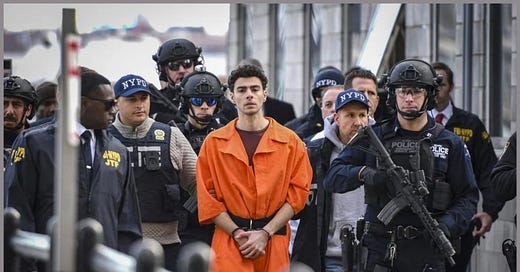Pacifists Make For The Best Assassins
Dietrich Bonhoeffer, Luigi Mangione, The Trolley Problem & the Paradox of Virtue.
Hear me out. Pacifists make for the best assassins because they understand the value of a life. They are not reckless or eager; they do not approach the act as thrill or necessity but as an act of precision. Reluctant until reluctance can not be justified. Violence, for the pacifist, is not a declaration but a question: What does this action preserve? What does it destroy?
A true pacifist knows restraint. They know the lines, the curves, the fractures in the logic of restraint. They hesitate because hesitation is their gift, not their weakness. They feel everything. It is precisely because they feel so deeply that they are capable of executing the unbearable.
They are inherent idealists. They believe in a world stripped of harm, and when they act, it is not out of desire or vengeance but out of an unshakable belief that this singular act might prevent a hundred others. A contradiction, but one they inhabit with a terrible purity. It is this purity that makes them lethal. The uncorrupted belief that what they do is necessary—and therefore, in some irreconcilable way, good.
This week I have been thinking a lot about Luigi Mangione and how we can draw a line to Dietrich Bonhoeffer. It is easy for us to think of Mangione as a boy of the YouTube generation and Bonhoeffer as some great man of theological rigor. The reality is much closer together. Mangione is 26-years-old ,the same age Bonhoeffer was when he returned to Germany after studying in Harlem. The same age as when he began actively opposing the Nazis in rhetoric. And only a few years younger than when he joined the German resistance movement and progressed from rhetoric to violent acts.




